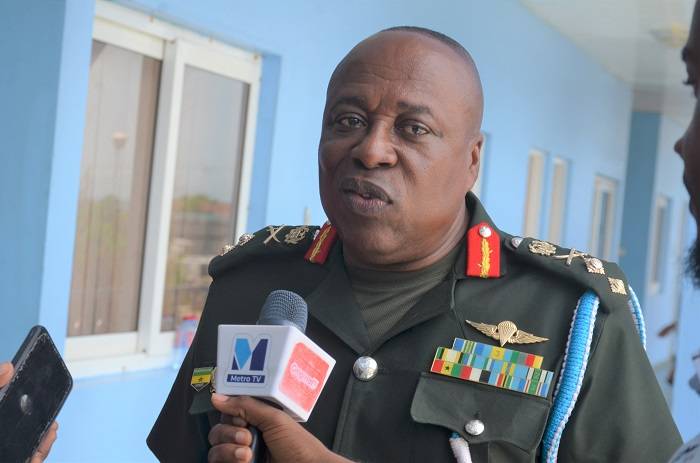
Commandant of the Kofi Annan International Peacekeeping Training Centre (KAIPTC), Major General Richard Addo Gyane, says the spreading footprint of violent extremism from the Sahel Region is “disturbing” and requires immediate attention and concerted efforts.
He said statistics from the 2023 Global Terrorism Index provided a sobering and disturbing assessment of the current situation in the Sahel region.
The Commandant, in a speech read on his behalf by Prof. Kwesi Aning, Director, Faculty of Academic Affairs and Research, KAIPTC at the opening of a course on “Preventing Violent Extremism, Radicalisation, and Small Arms Proliferation in the Sahel and Adjoining Coastal States in West Africa” at the Centre, said, “It is quite concerning, that in close to two decades, from 2007 to 2023, we have witnessed an alarming surge in terrorist activities in the Sahel.”
The project’s overarching goal is to enhance knowledge and foster information-sharing among security personnel and civil society actors in the fight against terrorism, violent extremism, and the proliferation of small arms in seven West African nations: Benin, Togo, Ghana, Cote d’Ivoire, Niger, Mali, and Burkina Faso.
In 2007, the Sahel region accounted for just one per cent of the global death toll due to terrorism but in 2023, the figure increased to a staggering 43 per cent.
Major General Gyane said the exponential increase was nothing short of a crisis as the Sahel had now become the epicentre of global terrorism, adding that the shift in the epicenter of terrorism was particularly striking considering the historical hotspots.
That, he stated, meant that the Sahel region now experienced a higher concentration of terrorist incidents and resulting casualties.
“One of the most concerning aspects is the spreading footprint of violent extremism. Burkina Faso has seen a significant increase in attacks, with 58 per cent of all incidents in the Sahel occurring within its borders. This expansion of violence from its origins in Mali to neighbouring countries paints a grim picture of the challenges we face.”
Maj. Gen. Gyane said the repercussions of the violent activities were not confined to the Sahel alone as the ripple effects had reached littoral countries, including Cote d’Ivoire, Benin, and Togo.
According to him, as the violence spreads, there are growing concerns about its potential to further expand into Ghana, underscoring the urgent need for collaborative, regional efforts to address the root causes and consequences of violent extremism and terrorism.
The worrying statistics, he said, compelled countries to recognise the gravity of the situation and to mobilise collective efforts, knowledge, and resolve to tackle the complex issues.
Mr Hisanobu Mochizuki, the Japanese Ambassador to Ghana, said the security challenges in the sub-region were causing enormous destruction to human lives and eroding socio-economic gains of affected countries.
To safeguard civilians and further human and economic progress, he said that substantial efforts were necessary to address the fundamental causes of insecurity in the Sahel and adjoining coastal countries.
Japan, the Ambassador said, was supporting the project with USD 491,940.00 in partnership with the United Nations Development Programme (UNDP) and the Kofi Annan International Peacekeeping Training Centre (KAIPTC) to prevent and counter-terrorism, violent extremism, and small arms proliferation, diversions, and trafficking.
Japanese Prime Minister Kishida during his visit to Ghana in May 2023 announced that Japan will provide approximately 500 million US dollars over the next three years to contribute to peace and stability and promote sustainable growth in the Sahel region and the neighbouring coastal countries of the Gulf of Guinea.
Mr Mochizuki said Japan had provided a cumulative total of about 10 million US dollars to the KAIPTC to date, to support numerous projects including training in small arms control, police capacity building, and border security management.
Mr Sukhrob Khoshmukhamedov, United Nations Development Programme (UNDP) Deputy Resident representative, said the UNDP remained committed to building skills of both security forces and non-state actors to promote peace, sustain social cohesion and prevent the spread of violent extremism.
“To ensure a stable West African sub-region, we need more effective collaboration and partnerships across borders to effectively deal with root causes and stamp out the double threats of violent extremism and small arms proliferation,” he said. — GNA





